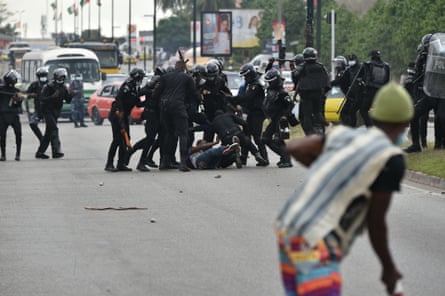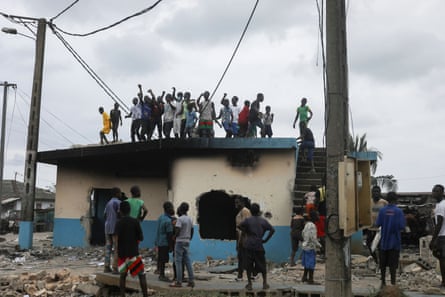- Alassane Ouattara has outstayed his welcome. His attempt to cling on for a third term could make parts of the country ungovernable
Vava Tampa@VavaTampa, The Guardian (UK), Published on Thu 20 Aug 2020

Ouattara’s decision to run for a third term has been met with protests. Photograph: Diom Celest/EPAGlobal development is supported by
This month the president of Ivory Coast caused outrage which spilled into bloodshed on the streets of the capital, Abidjan, when he announced he would seek a third term in office after all.
Tensions are running high in the country after months of violence surrounding the disputed presidential election in 2010. Just five months ago, the 78-year-old Alassane Ouattara had announced his retirement, pledging to “transfer power to a new generation”.
So why is Ouattara now so afraid to relinquish power? Why did he not proudly allow Ivory Coast’s first-ever peaceful transfer of power to take place, which could have been his greatest legacy, nine years after a bloody civil war?With total control, President Déby is Chad’s greatest threat to stabilityVava TampaRead more
And if he becomes another life president – against the constitution – how many more people will be plunged into hardship and worsening crisis? These are the salient questions that many people in Ivory Coast are asking – and rightly so.
The resistance to giving up power in Africa is not unique to Ivory Coast. It is a growing trend across the continent, causing joblessness, conflict, corruption, economic decline, and human rights abuses. Even Paul Kagame, the west’s standard-bearer for “good African leadership”, changed the constitution to cling to power. In fact, according to the Economist’s 2019 Democracy Index, more than half of Africa’s 55 countries are ruled by a “life president” or – in the words of the report’s authors – “authoritarian regimes”.

Ouattara was previously scathing about those who failed to relinquish power. Photograph: Luc Gnago/Reuters
What makes Ouattara’s decision to run for a third unconstitutional term particularly troubling is that the political climate in Ivory Coast is ripe for electoral crises. A full-scale civil war could make parts of the country’s south-east regions, where opposition to Ouattara is strongest, ungovernable, leading to further deterioration of socioeconomic conditions in the country.
This is especially worrying for a country ravaged by on-off civil unrest since the 2010 civil war that killed 3,000 and displaced approximately 300, 000 people. Last week at least five people were killed and more than 100 injured in three days of pre-election street clashes between opposition and security forces, heightening the tense atmosphere.
Ivory Coast, the world’s top producer of cocoa beans, should be one of the most economically prosperous countries in Africa. According to data from the International Cocoa Organisation, the country produces 45% of the cocoa in the $100bn (£76bn) global chocolate industry.
But because of life presidency and post-electoral violence, poverty levels remain high, with nearly half of the 25 million Ivorians living on $1.22 a day. Life expectancy stands at 54. Women make up more than 50% of those who are unemployed and at least 12% of the population is food insecure. Out of 189 countries, Ivory Coast is ranked 165 on the 2019 UN human development index, and 165 out of 189 on the gender inequality index.
As a young man, Ouattara – who draws support from the largely Muslim north-west regions – was scathing about those who failed to relinquish power. In March he said he would not run for a third term in the elections on 31 October.

Street clashes between protestors and security forces last week have heightened the tense atmosphere. Photograph: Sia Kambou/AFP/Getty Images
He nominated his former prime minister, Amadou Gon Coulibaly, to replace him – a move that was seen as an attempt to maintain his influence through a close ally, but which was nonetheless welcomed as a small step forward. Coulibaly died of a heart attack in July.
His decision now to seek a third unconstitutional term has come as a shock to the rest of the world. Will the international community act in time to prevent further post-electoral violence that could even spiral into another civil war?
He believes he is indispensable to the welfare of his people and the wellbeing of Ivory Coast
Ouattara, who still enjoys the support of France, is defiant; becoming the latest in a long line of African leaders to push past a constitutionally imposed two term limit, a well-trodden path for life presidency. He believes he is indispensable to the welfare of his people and wellbeing of Ivory Coast, that there is no one among the 25 million Ivorians better suited for the job than him. It’s reminiscent of Cameroon’s ailing president, Paul Biya, who holds Africa’s record for the longest-serving “life president” at 42 years.
Compounding the security challenges is Ouattara’s refusal to reform the electoral commission – long considered biased in his favour – to even up the playing field and spare the people potentially horrific electoral violence.

Whether Ivorians will continue to peacefully take to the streets to ask Ouattara to leave is an open-ended question. Photograph: Luc Gnago/Reuters
Ouattara doesn’t want to relinquish power because he doesn’t trust those around him and he is worried about accusations of the funnelling of government funds, among other things. The businesses that he and his family have built up in Ivory Coast and abroad have brought them millions of dollars. Whether Ivorians will continue to peacefully take to the streets to ask him to leave is an open-ended question.
But what is clear about Ouattara’s decision to run for an unconstitutional third term is that the future of Ivory Coast and the political future of the entire region are at risk. The seeds are being sown for crises that have been the hallmark of Ivory Coast since independence from France in 1960.





